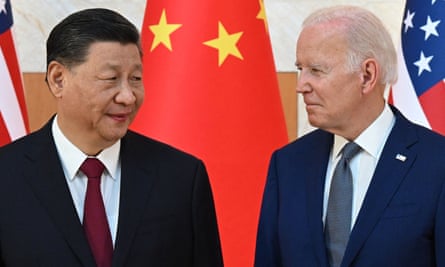According to an NGO, Taiwan’s upcoming presidential election in January presents a chance for Taipei and Beijing to restart communication, decrease tensions, and lessen the possibility of conflict.
According to a report from the International Crisis Group, while a war regarding Taiwan is not guaranteed, the current path is concerning.
Taiwan is now considered the greatest potential flashpoint for conflict between China and the US, which is Taiwan’s strongest supporter. The report calls for all parties to take a step back, clarify their positions and “re-establish a baseline level of trust”.
The Chinese government, under the leadership of Xi Jinping, regards Taiwan as a province of China and is determined to reunite it. While it aims to do so through peaceful methods, it has not ruled out the use of force.
The Taiwanese government, headed by Tsai Ing-wen of the Democratic Progress party, asserts that Taiwan is an independent nation and its citizens strongly oppose the idea of Chinese control in favor of the complex yet peaceful current situation. According to a recent survey by the Taiwanese mainland affairs council, 85.3% of the population is against Beijing’s suggestion of “one country, two systems”.
Following Tsai’s election in 2016, Beijing ceased all communication with Taipei due to the DPP’s stance. For several years, Beijing has actively worked towards isolating Taiwan on the global stage and imposing economic sanctions, ultimately fueling resistance to reunification among Taiwanese citizens. As a result, the relationship between the two sides remains at a precarious standstill.
Tsai is expected to resign in the beginning of next year, completing her maximum two terms in office. According to the report, this transition may create a chance to restart communication between Taiwan and mainland China. If the Democratic Progressive Party (DPP) wins the election, taking into consideration that the opposing Kuomintang (KMT) party has already established a relationship with Beijing, the report suggests that both parties should strive to reach a mutually agreeable political agreement regarding their cross-strait relationship.

In the event that this is considered to be too extreme given the current tensions, a new DPP administration may find alternative ways to resume discussions with Beijing as a means of encouraging them to lessen economic, military, and political pressure. At the same time, Taiwan must enhance its defenses in order to present a viable deterrent against potential Chinese invasion.
The Chinese government in Beijing has intensified its use of force and intimidation tactics against Taiwan, such as practicing for a potential attack, launching cyber-attacks, and significantly increasing the number of Chinese military aircraft entering Taiwan’s air defense zone. On Monday, Taiwan’s defense ministry announced that Chinese planes had conducted multiple maneuvers, including surrounding the main island.
According to the report, the United States is supplying weapons to Taiwan to support its self-defense and has been vocal in its support. The US also has a responsibility to help decrease tensions. The report mentions meetings between high-ranking officials and US politicians who are taking aggressive stances for political gain. It suggests that the actions of Washington could potentially increase the likelihood of conflict.
Avoid the newsletter promotion.
after newsletter promotion
According to the report from Amanda Hsiao, the senior China analyst at the International Crisis Group, the chances of a Chinese takeover of Taiwan in the near future are slim, but the potential for conflict is increasing.
“Effective management of the situation necessitates the parties rebuilding a foundation of trust by reinforcing longstanding political agreements. The United States should provide credible assurance to China that it does not intend to permanently separate Taiwan from the mainland. Taiwan should provide credible assurance to China that it does not seek formal independence. Beijing should provide credible assurance to both Washington and Taipei that it has no intention of unifying with Taiwan through military force.”
Further investigation conducted by Chi Hui Lin
Source: theguardian.com


